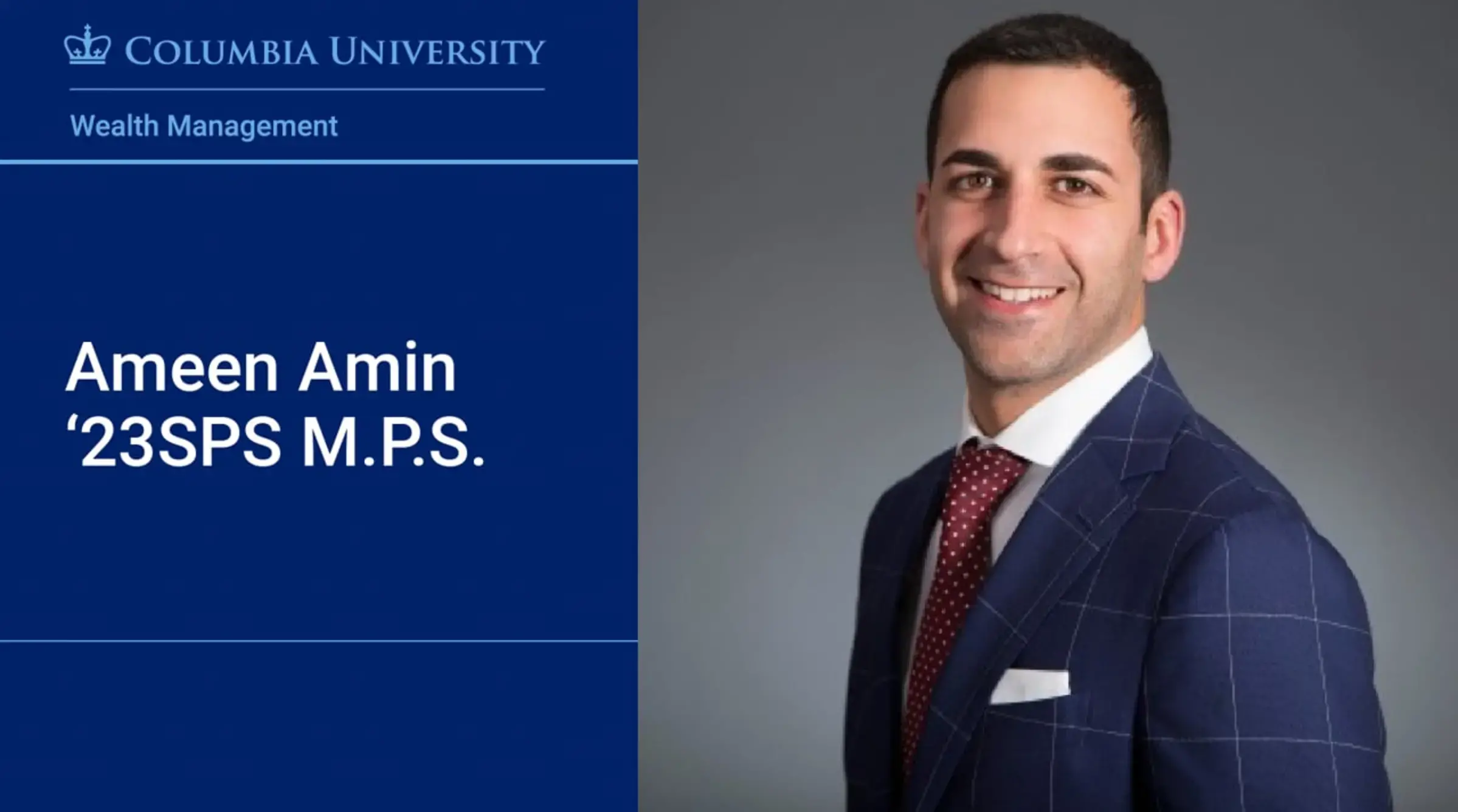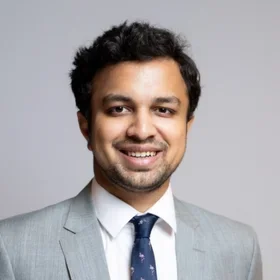Ameen Amin joined financial services firm Morgan Stanley in 2016 and quickly began rising through its ranks—first graduating from the associate program, then joining the Pacesetter’s Club, a rare recognition given to early-career advisors. “One decision that I committed to early in my career that has served me well is embracing complexity,” he says. Amin specializes in advising middle-market business owners on the options available to them in the private markets as well as ultra-high-net-worth and family office clients as they allocate to alternative investments.
In 2021, he applied for Columbia University’s M.P.S. in Wealth Management, a 16-month online graduate program with instruction from experts with deep experience across the wealth management industry. The flexible nature of the graduate program enabled Amin to learn while continuing to grow his practice.
Amin appreciated the collaborative learning environment that Columbia provided, a departure from the competitive, learn-as-you-go nature of the profession. Says Amin: “The greatest benefit of this program is being able to do it in tandem with your professional career so that you can leverage what you’re picking up in the classroom for the benefit of your clients.”
Just two months after earning his master’s in December, Amin was promoted to First Vice President at Morgan Stanley. He recently spoke with Shana Childs (’14JRN) about his ascent and the ways his Columbia Wealth Management experience enhances his career journey.
Congratulations on your recent promotion to First Vice President! You’re 31—how were you able to work your way up so quickly?
It’s surreal, to be frank. Advisors do not get to decide if they are successful; clients do, and I owe my success to the clients who were kind enough to put their trust in me. In addition to that, I’ve been fortunate to have a support system, ranging from colleagues to family and friends, that saw something in me even when I didn’t.
One decision that I committed to early in my career that has served me well is embracing complexity. I always felt that the best advisors are ones who can solve the most complex problems of their clients, regardless of industry. Where there is complexity, there is value.
How has that shaped your practice? What problems are you solving?
It made me more disciplined in identifying the type of clients to work with and, just as important, who not to work with. It helped me understand that my goal is to be the best advisor to a select few rather than an average advisor to many. I work with two client profiles.
The first is business owners: I help them navigate key strategic needs such as access to capital and exploring a variety of exit strategies by bringing in the right investment bankers for their business while managing the pre-, during-, and post-liquidity event planning for their personal balance sheet.
Next is ultra-high-net-worth and family office clients: I’m an Alternative Investments Director at the firm and advise sophisticated investors as they look to allocate to alternative and private markets where appropriate, including but not limited to direct investments, private equity offerings, hedge funds, and so on.
What led you to apply to Columbia’s M.P.S. in Wealth Management?
I always come back to these two reasons: The first is that if you are in the advice business, you are the product. If that’s the case and you’re committed to being the best at your craft, when is a good time to stop learning? The other reason: Columbia provided me with a rare opportunity to examine my practice through a holistic educational lens. Most advisors learn through experience, but this program gave me a comprehensive bird’s-eye view of wealth management. Having an environment where you can raise your hand and not be afraid to ask questions is invaluable.
How are you applying what you’ve learned at Columbia?
What I love about the program, especially as a practitioner, is that you don’t have to wait long to utilize the plethora of knowledge you pick up along the way. I have no shortage of examples that range from estate-planning strategies to behavioral psychology. Even personally, the Wealth Management Landscape class helped me better understand the strengths and weaknesses of wealth management platforms (e.g., RIAs, broker dealers)—including my own!
How have you built relationships with classmates, professors, and industry professionals?
The network that came with the program might just be my favorite part. Even though practitioners are constantly surrounded by people, it’s easy for it to feel like a lonely business. I genuinely love my classmates, and having an environment where you can share thoughts and ask questions, despite being in a competitive industry, is worth its weight in gold. Add to that the talented instructors as well as faculty that genuinely want to see you win, and you’ll understand why I am such a fan of the experience I went through. As I initially shared, my support system is at the core of my success, and I feel incredibly lucky to add my Columbia family to it also.
About the Program
A 16-month online program with asynchronous instruction, specially designed to accommodate working professionals, Columbia University’s Master of Professional Studies in Wealth Management program is taught by distinguished faculty with deep, applied experience in their respective fields. Additionally, it is a CFP Board Registered Program designed to help students meet the educational requirements for CFP® certification.
The final application deadline for fall 2023 enrollment is June 15. Students who have international transcripts are encouraged to apply by March 15. Learn more.



